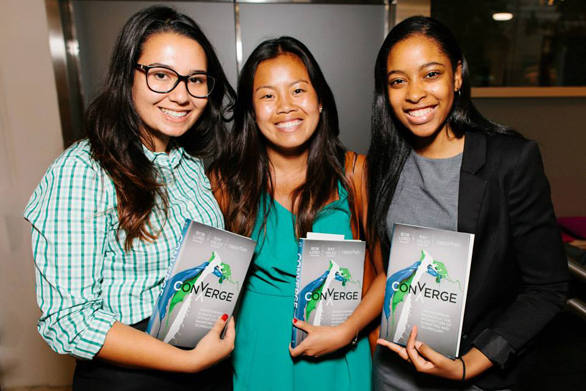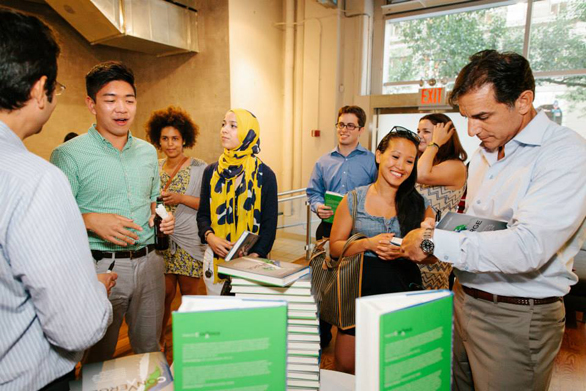
Three young professionals hold Bob Lord’s book, “Converge.” Lord’s biggest piece of advice for the young—learn to code. Photo: Mackler Studios
“Your lifestyle is the future of marketing,” Bob Lord told a group of young New Yorkers at the TED Annex (our new spillover office) on Tuesday night. About 80 interns and young professionals from local marketing firms came together to eat pizza and hear Lord’s advice on merging creativity and digital know-how, during a conversation with TED’s own Ronda Carnegie.
Lord is the global CEO of digital marketing agency Razorfish, but his bachelor’s degree is in engineering — and he describes his background in programming robots as crucial to the way he shapes brand experiences today. “Technology is the engine that makes marketing work,” he said, “Especially when you have the technical background to be able to say ‘API’ without being afraid of it.”
Following some nervous giggles in the room — there were definitely some API-phobes in the audience — Bob elaborated on the conceptual changes he has seen in the marketing industry during his career. Watching Mad Men is not the way to learn everything you need to know about marketing; instead, he suggests, Mad Men reflects a (fictionalized) past where employees held tightly to their own ideas, and “creating the brand perception of, say, the Marlboro Man was considered a great idea,” he said. Lord, it turns out, much prefers the contemporary model of a Foursquare/Starbucks collaboration, a digital pairing that contributes to their brands’ reality — and is actually useful for customers.
He notices that sometimes millennials — people born between the early 1980s and the early 2000s — take their digital savvy for granted. “Just watching my kids do research is phenomenal,” he said, describing how they find and synthesize information from seemingly hundreds of websites. That ability to filter so much information, which some millennials have been doing for the majority of their lives, enables this newly adult generation to act as “what IDEO calls ‘T-shaped’ employees – specialists who can see the broad picture and objectives,” he said.

Lord, the CEO of Razorfish, signs books in the TED Annex. Photo: Mackler Studios
And after almost a lifetime of archiving their personal histories on social media, millennials have developed a sensibility for branding and storytelling that can be remarkably useful for companies. As Lord said, navigating the social media world has created a generation of experts in sniffing out disingenuous marketing campaigns, like the Qwikster fiasco.
With their innate sense of online authenticity, and their ability to filter and synthesize, millennials may have a leg up on modern marketing careers — but they can capitalize on it, Lord says, by developing their digital skills too. The biggest piece of advice from the CEO of a leading digital agency: Learn to code! A creative young person who also knows how to program will have the lay of the land at any progressive company.
If you are interested in learning more about the generation born between the early 1980s and 2000, check out these talks below:
[ted id=1741]
[ted id=1438]
Comments (6)
Pingback: 5 Tech Skills You’ll Need To Succeed In 2016 | Zip Code Wilmington Code School